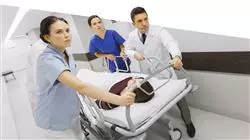University certificate
The world's largest faculty of nursing”
Introduction to the Program
Thanks to this program you will delve into the role of the nurse and his/her psychological role when intervening in critical situations with a future approach”

The seriousness of the conditions that nurses are confronted with in the emergency area requires a much more demanding intervention than in other areas where a diagnosis and a clinical application are not requested so immediately. The importance of psychological support comes to the fore, for example, in cases of suicide or gender violence. Clinical care for the relatives of these victims must be very precise in the first instance, in order to be able to carry out a clinical service that stabilizes their post-traumatic stress and can evolve in their hospital follow-up afterwards.
Given the importance of integrating into this care an adequate management of the situation based on the emotional environment and acting preventively in the diagnosis and the possible occurrence of post-traumatic sequelae, TECH has developed a rigorous degree that focuses on urgencies and emergencies. This is a complete educational guide to improve your health and psychological performance and, therefore, your professional and personal development.
It is a program comprising 1,500 hours of the best theoretical, practical and supplementary material, through which students will be able to build exhaustive knowledge of therapeutic strategies tailored to a range of crisis contexts and the specific needs of victims. In this sense, students will gain knowledge in the care of patients with intellectual disabilities, victims of sexual abuse or witnesses of the death of a family member. A degree focused on strengthening the psychosocial support and positive response to patients in the emergency department.
A 100% online degree, designed in cooperation with experts versed in the different areas of emergency health care, whose main objective is to expand and update the basic skills of psychological first aid of the graduates in Nursing. Throughout 12 months, students will discover the pedagogical future, enrolling in a degree that proposes flexible study schedules and that will be available on internet to streamline their educational experience.
You will investigate post-traumatic stress situations and their long-term effects to understand the importance of first- and second-instance intervention”
This Professional master’s degree inUrgent and Emergency Psychology contains the most complete and up-to-date scientific program on the market. The most important features include:
- The development of practical cases presented by experts in Psychology and Emergency Services
- The graphic, schematic, and practical contents with which they are created, provide scientific and practical information on the disciplines that are essential for professional practice
- Practical exercises where the self-assessment process can be carried out to improve learning
- Its special emphasis on innovative methodologies
- Theoretical lessons, questions to the expert, debate forums on controversial topics, and individual reflection assignments
- Content that is accessible from any fixed or portable device with an Internet connection
With this degree you will not only acquire the knowledge required to care for patients in the emergency department, but you will also identify burnout syndrome and other pathologies in your professional colleagues”
Includes in its teaching staff a team of professionals from the field who bring to this program the experience of their work, in addition to recognized specialists from prestigious reference societies and universities.
The multimedia content, developed with the latest educational technology, will provide the professional with situated and contextual learning, i.e., a simulated environment that will provide immersive education programmed to learn in real situations.
This program is designed around Problem-Based Learning, whereby the professional must try to solve the different professional practice situations that arise during the academic year For this purpose, the student will be assisted by an innovative interactive video system created by renowned and experienced experts.
The Professional master’s degree includes the simulation of real cases in which you will have to intervene through group and individual techniques depending on the case"

Adopt the Peer Support posture to carry out your profession providing emotional support to those around you in the workplace"
Why study at TECH?
TECH is the world’s largest online university. With an impressive catalog of more than 14,000 university programs available in 11 languages, it is positioned as a leader in employability, with a 99% job placement rate. In addition, it relies on an enormous faculty of more than 6,000 professors of the highest international renown.

Study at the world's largest online university and guarantee your professional success. The future starts at TECH”
The world’s best online university according to FORBES
The prestigious Forbes magazine, specialized in business and finance, has highlighted TECH as “the world's best online university” This is what they have recently stated in an article in their digital edition in which they echo the success story of this institution, “thanks to the academic offer it provides, the selection of its teaching staff, and an innovative learning method aimed at educating the professionals of the future”
A revolutionary study method, a cutting-edge faculty and a practical focus: the key to TECH's success.
The most complete study plans on the university scene
TECH offers the most complete study plans on the university scene, with syllabuses that cover fundamental concepts and, at the same time, the main scientific advances in their specific scientific areas. In addition, these programs are continuously being updated to guarantee students the academic vanguard and the most in-demand professional skills. In this way, the university's qualifications provide its graduates with a significant advantage to propel their careers to success.
TECH offers the most comprehensive and intensive study plans on the current university scene.
A world-class teaching staff
TECH's teaching staff is made up of more than 6,000 professors with the highest international recognition. Professors, researchers and top executives of multinational companies, including Isaiah Covington, performance coach of the Boston Celtics; Magda Romanska, principal investigator at Harvard MetaLAB; Ignacio Wistumba, chairman of the department of translational molecular pathology at MD Anderson Cancer Center; and D.W. Pine, creative director of TIME magazine, among others.
Internationally renowned experts, specialized in different branches of Health, Technology, Communication and Business, form part of the TECH faculty.
A unique learning method
TECH is the first university to use Relearning in all its programs. It is the best online learning methodology, accredited with international teaching quality certifications, provided by prestigious educational agencies. In addition, this disruptive educational model is complemented with the “Case Method”, thereby setting up a unique online teaching strategy. Innovative teaching resources are also implemented, including detailed videos, infographics and interactive summaries.
TECH combines Relearning and the Case Method in all its university programs to guarantee excellent theoretical and practical learning, studying whenever and wherever you want.
The world's largest online university
TECH is the world’s largest online university. We are the largest educational institution, with the best and widest online educational catalog, one hundred percent online and covering the vast majority of areas of knowledge. We offer a large selection of our own degrees and accredited online undergraduate and postgraduate degrees. In total, more than 14,000 university degrees, in eleven different languages, make us the largest educational largest in the world.
TECH has the world's most extensive catalog of academic and official programs, available in more than 11 languages.
Google Premier Partner
The American technology giant has awarded TECH the Google Google Premier Partner badge. This award, which is only available to 3% of the world's companies, highlights the efficient, flexible and tailored experience that this university provides to students. The recognition as a Google Premier Partner not only accredits the maximum rigor, performance and investment in TECH's digital infrastructures, but also places this university as one of the world's leading technology companies.
Google has positioned TECH in the top 3% of the world's most important technology companies by awarding it its Google Premier Partner badge.
The official online university of the NBA
TECH is the official online university of the NBA. Thanks to our agreement with the biggest league in basketball, we offer our students exclusive university programs, as well as a wide variety of educational resources focused on the business of the league and other areas of the sports industry. Each program is made up of a uniquely designed syllabus and features exceptional guest hosts: professionals with a distinguished sports background who will offer their expertise on the most relevant topics.
TECH has been selected by the NBA, the world's top basketball league, as its official online university.
The top-rated university by its students
Students have positioned TECH as the world's top-rated university on the main review websites, with a highest rating of 4.9 out of 5, obtained from more than 1,000 reviews. These results consolidate TECH as the benchmark university institution at an international level, reflecting the excellence and positive impact of its educational model.” reflecting the excellence and positive impact of its educational model.”
TECH is the world’s top-rated university by its students.
Leaders in employability
TECH has managed to become the leading university in employability. 99% of its students obtain jobs in the academic field they have studied, within one year of completing any of the university's programs. A similar number achieve immediate career enhancement. All this thanks to a study methodology that bases its effectiveness on the acquisition of practical skills, which are absolutely necessary for professional development.
99% of TECH graduates find a job within a year of completing their studies.
Professional Master's Degree in Urgent and Emergency Psychology
The intervention of nurses in emergency situations is not limited only to providing first aid. The psychological shock produced by unexpected circumstances such as catastrophes or major accidents is often so intense that the fear of imminent death can be even worse than the injuries or traumas themselves, both in the patient and in his or her close emotional circle. That is when healthcare professionals must possess unique competencies that contribute to complete comprehensive care. For this reason, TECH Global University presents its Professional Master's Degree in Emergency Psychology: a postgraduate course of a 100% online nature consisting of 1500 hours where you will be able to internalize aspects such as: human response associated with stress and sequelae of the critical situation, psychological first aid, psychotherapy with victims in traumatic situations, among others. The differential plus of this educational offer is that you will be able to freely regulate your learning time and have access to a whole methodological and multimedia cutting-edge scheme.
The best postgraduate nursing program in emergency psychology
According to several studies conducted by the Pan American Health Organization in various countries around the world, the COVID-19 pandemic caused a considerable increase in mental disorders such as depression, anxiety and insomnia. In regions such as the United States alone, depressive pathologies increased from 36.4% to 41.5%, while in Latin America, reports indicated that 85% of citizens reported at least one symptom of deterioration in their mental health. Faced with crises of this magnitude, the importance of reinforcing psychological intervention in emergencies and emergencies in areas such as nursing is evident. Thanks to this Professional Master's Degree you will acquire a weighty title in this sense, without having to leave home, managing your classes and living an immersive experience with the best teachers and a vast digital material of high quality that involves from psychosocial support in emergencies and disasters to topics such as clinical hypnosis and types of psychological disorders. With TECH you are guaranteed your professional future.







